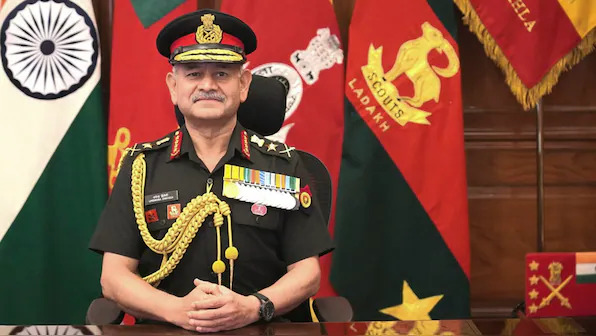Within just ten days of taking on his new role, India’s new Army Chief, General Upendra Dwivedi, faces rising terrorist activities in South Jammu. During this period, the army has faced six fatal and five non-fatal casualties, highlighting the immediate challenges in managing the increasing violence.
With the upcoming Jammu and Kashmir assembly elections and monitoring military activities across the Line of Actual Control with China, this situation demands significant attention from the new army chief. Pakistan, its army, and associated terrorist groups further complicate the security landscape. General Dwivedi, who previously led the Northern Command, is well acquainted with this scenario.
Is Jammu Becoming a New Center for Terrorism?
Despite strides towards peace and prosperity in the Kashmir Valley, terrorist activities have increased in the Jammu region over the past four years. This week, within 48 hours, the army faced two terrorist attacks in Jammu. On Monday, five soldiers were injured when terrorists attacked an army vehicle in the hilly area of Machhedi in Kathua district. On Sunday, terrorists attacked an army camp in Manjakote village in Rajouri district, injuring one soldier.
However, the Kashmir Valley is not entirely free from terrorism. On Saturday, two soldiers were killed in encounters in Kulgam district. Security forces killed at least six terrorists in these encounters, underscoring the continued threat of terrorism.
The Jammu region of the Union Territory of Jammu and Kashmir comprises ten districts: Jammu, Doda, Kathua, Ramban, Reasi, Kishtwar, Poonch, Rajouri, Udhampur, and Samba. This area is mainly hilly and mountainous, including the Pir Panjal range and the Greater Himalayas. In recent years, the 9 Corps based in Yol, Himachal Pradesh, overseeing the 26th Infantry Division based in Jammu, has been involved in counter-terrorism operations.
Increase in Terrorism
Last month, there were four attacks in Jammu and Kashmir over three days. In June, terrorists attacked a bus of pilgrims, killing at least nine people and injuring 33 others. In April, unknown terrorists killed a government employee named Mohammad Razak in Rajouri district. Additionally, in Udhampur district, village defense guard member Mohammad Sharif was killed in an encounter. A CRPF constable named Kabir Das was killed, and five others were injured in another terrorist attack.
In May, terrorists attacked an Indian Air Force convoy in Poonch district, killing one soldier and injuring four others. According to Home Ministry data, 174 civilians died in terrorist incidents between 2018 and 2022, while 35 civilians were killed in actions by security forces. The rising casualties among security forces have raised serious concerns for the government.
Increase in Military Casualties
In the past three years, Jammu has witnessed several severe terrorist incidents. Since October 2021, there have been multiple attacks on army personnel in Surankote and Mendhar. In August 2022, an attack on an army camp in Rajouri killed five soldiers. Violence significantly increased in 2023. In April and May 2023, ten soldiers died in Poonch and Rajouri.
In May 2023, an IED blast in Rajouri killed five army paratroopers and injured a major. In the same year, seven people from a minority community were killed in Dhangri village, Rajouri district. At the start of 2024, terrorists killed a social welfare department officer in Shahdara Sharif.
Challenging Terrain
The difficult geography of the region adds to the challenges for security forces. Areas like Bhimber Gali and Dera Ki Gali are particularly dangerous for security forces. These areas are covered with dense forests and hilly terrain, providing hiding places for terrorists. Additionally, harsh weather conditions make operations even more challenging.
‘Vigilant’ Terrorists
Terrorist groups have become highly vigilant, leaving no digital or airwave footprints to hide their locations. Earlier this year, former Army Chief General Manoj Pande cited the lack of human intelligence in the Rajouri-Poonch area as a major factor disrupting the army’s counter-terrorism operations.
Facing Immediate Crises
General Dwivedi’s tenure begins with the intense pressure of rising terrorist activities in Jammu. His leadership skills will be crucial not only in addressing current security threats but also in focusing on the broader strategic goals of the Indian Army. Reducing the ongoing violence and enhancing long-term preparedness will be the test of his leadership.
























